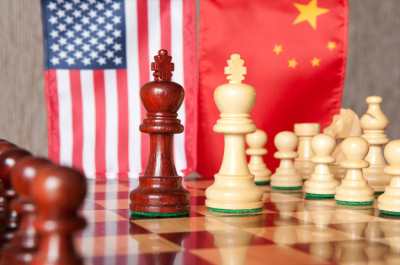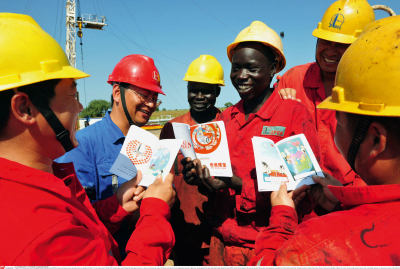China-US Relationship Affects Global Economic Affairs
By Morgan Brady
 中美不仅是全球重要的经济体,而且经济总量位处世界前两位——中美两国经济总量占全球比重稳定在三分之一左右,这显示了两国在总量意义上对全球经济的重要性,客观上构成了全球经济增长的重要基础。伴随经济全球化趋势进一步加深,中美经济与外部联系日益增强,中美经济波动不仅影响自身宏观经济稳定,而且对其他经济体也将构成较大的溢出效应,对石油等大宗商品价格将造成影响。美国凭借较强的科技、军事及美元霸权等综合实力影响全球经济发展,中国通过承接全球产业分工形成的制造业大国地位及其位居世界第二的体量对全球经济发展也将形成内在影响。那么中美之间的矛盾居于首位还是合作面为主导呢?
中美不仅是全球重要的经济体,而且经济总量位处世界前两位——中美两国经济总量占全球比重稳定在三分之一左右,这显示了两国在总量意义上对全球经济的重要性,客观上构成了全球经济增长的重要基础。伴随经济全球化趋势进一步加深,中美经济与外部联系日益增强,中美经济波动不仅影响自身宏观经济稳定,而且对其他经济体也将构成较大的溢出效应,对石油等大宗商品价格将造成影响。美国凭借较强的科技、军事及美元霸权等综合实力影响全球经济发展,中国通过承接全球产业分工形成的制造业大国地位及其位居世界第二的体量对全球经济发展也将形成内在影响。那么中美之间的矛盾居于首位还是合作面为主导呢?
从非洲问题上看,中国是非洲最大的贸易伙伴,特朗普的团队同样关注美国在非洲同中国的竞争,甚至一度问出“我们是不是输给中国了?”这样的问题。一些非洲国家的政府官员们也相信中美在非洲的竞争陷入零和博弈。中国通过在非洲大搞基础设施建设,投资自然资源和其他领域,加快了与非洲交往的进程。但与此同时,两国都应该清楚,在非洲,他们共同的工作重点大于分歧,而中美眼中的工作重点,同时也被很多非洲国家所认同。
在制造业方面,中国已经从传统手工业制造业慢慢向高科技产业转型。无人机、智能应用、AI、电子商务等等新兴科技的发展已经抢占了更大的市场,现在的中国正在迅速跟进世界的发展步伐。然而从美国看来,中国的迅速崛起则是对美国的巨大威胁。
在金融领域,中国也日益获得了更大的市场份额。吸引了更多的外资入驻中国。
与此同时,中美非都大体上同意支持经济增长和发展、对抗疾病、消解冲突、增强政治稳定、对抗暴力极端组织和有组织犯罪的重要性。
中美在全球都具有举足轻重的地位,由此决定中美未来在国际经济秩序中的话语权分配可能面临着竞争或者冲突。但中美互为重要贸易伙伴,中美经济分处不同的发展阶段,这些决定了中美的互补性大于竞争性。积极构建中美新型大国经济关系,助推中美经济乃至全球经济健康稳定发展,才是重中之重。
USA and China are the two biggest economies in the world. The two are considered economic gravity centres, whose economic activities affect regional and global economies alike. Given their size and global reach, the relationship between the two can fall somewhere on a spectrum between high cooperation and intense competition.
In reality, the relationship is a mix of both, cooperation and competition. Both countries have different opinions on a wide range of issues. However, when it comes to trade, China is the largest trade partner with the US with a total trade size of $578.2 during 2016. Moreover, China is the US’s biggest lender. It seems that cooperation in the area of business and economics, at least, is beneficial for both parties.
 Competition over Influence in Africa
Competition over Influence in Africa
Despite diplomatic relationships, rivalry between the two countries remains strong. In Africa, the competition can be seen very clearly. When the former US president Barack Obama announced a $7 billion program to build energy projects in Africa, China was taking notice. China’s involvement in providing needed resources and projects for generating energy in the Sub-Saharan region amounted to $13 billion between 2010 and 2015. The two countries are ostensibly competing for influence over an energy-hungry region with a positive economic growth trajectory. The result is large energy projects in the region that reflected well on the lives of millions, although the region still needs much more.
Involvement of the two countries in the African region exceeds the energy sector, of course. However, there is a key difference between the approaches of the two countries. The US often sets conditions on governments who want to receive its investments, such as rooting out corruption and carrying out reform. China, on the other hand, is only concerned with business affairs and making projects successful. This makes Chinese projects much more appealing to recipient governments.
 China’s Manufacturing Prowess Is Paying Off
China’s Manufacturing Prowess Is Paying Off
Another important area of competition is manufacturing. This area has caught the attention of the current US president Donald Trump who is keen on seeing US factories return home and hire local workers. Yet, the far-reaching supply chains in China and the intensive experience in manufacturing make that an elusive goal. China has strong manufacturing infrastructure. Today, it is a leading manufacturer of drones, cell phones, and solar panels, to name a few products.
China’s experience in manufacturing has surpassed the stage of mere production of someone else’s idea. Due to accumulated experience in manufacturing, China now has moved up in its ability to innovate. One example of this is its drone manufacturing ability where it has contributed with innovative products and their components.
In fact, excelling in innovation has been one of the goals of Chinese President Xi Jinping for China. China today is beyond being a manufacturing powerhouse, and it uses those very same capabilities to become a leader in innovation. It has made advances in areas such as hypersonic missiles, human gene editing trials, and quantum satellites. But the area that the US is mostly concerned about is China’s advancement in the area of Artificial intelligence, where it is catching up quickly. Those advances have implications for all aspects of human life, and the US perceives such advances to be a vital threat to America’s economic might.
America is losing its cards quickly to China - a rising dragon and its concern is well-justified, given that technology and innovation are the last few cards that it has in its competition with China.

China launched the first-ever quantum communications satellite
Competition in the Financial Sphere
The financial sphere is also an arena where China has become increasingly competitive and is earning a bigger market share. The case of AliPay illustrates this success. Chinese company AliPay is similar to PayPal in that it manages third-party payments. Today, AliPay has three times the market share of PayPal in regard to processing global transactions. The Chinese bond market has recently become $11 trillion in size and has been successful in attracting foreign capital. In short, China is becoming more and more integrated into the global financial system.
Conclusion
Americans and Chinese are competing on multiple fronts at the same time. The Chinese are faring better in almost all respects, and the implications are worrisome for America. Economic superiority and innovation capabilities may very well soon translate into military superiority.
There are already reports indicating that China and Russia are catching up with their western counterparts and the US in terms of military power. The two countries are large enough that their competition is shaping global affairs. Capital flows around the world, long value chains, innovation, and high technology are all different elements that are affected directly or indirectly by this competition. Understanding it is the key to predicting the future of global affairs with more accuracy.